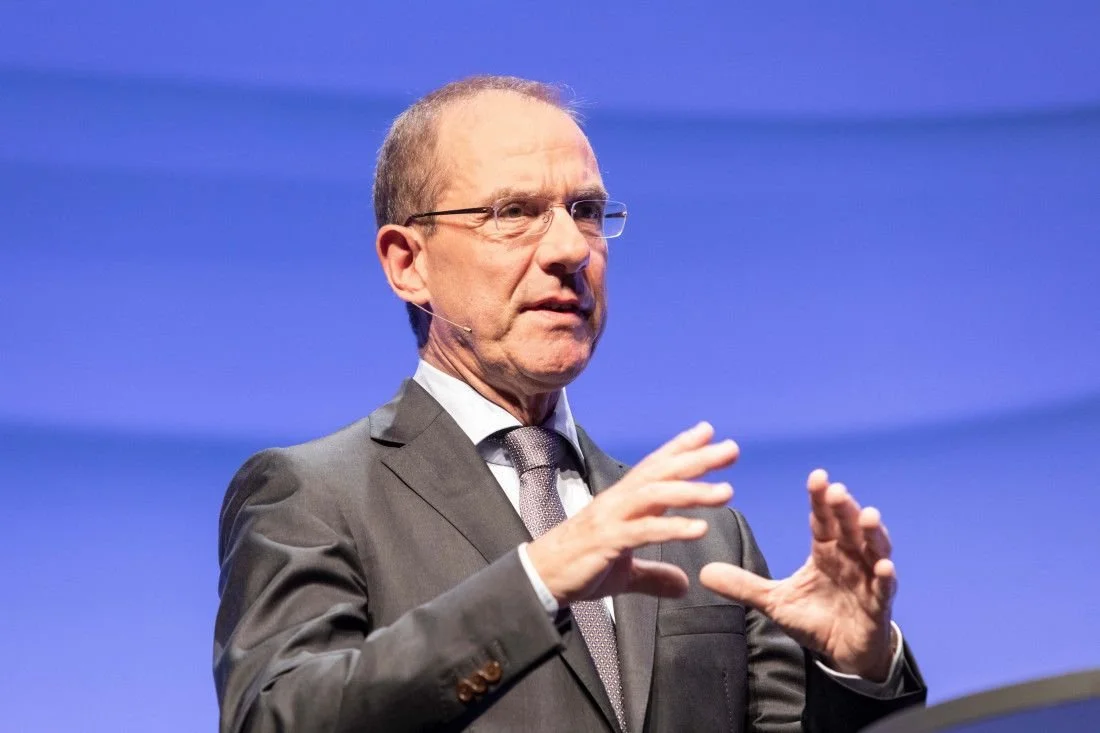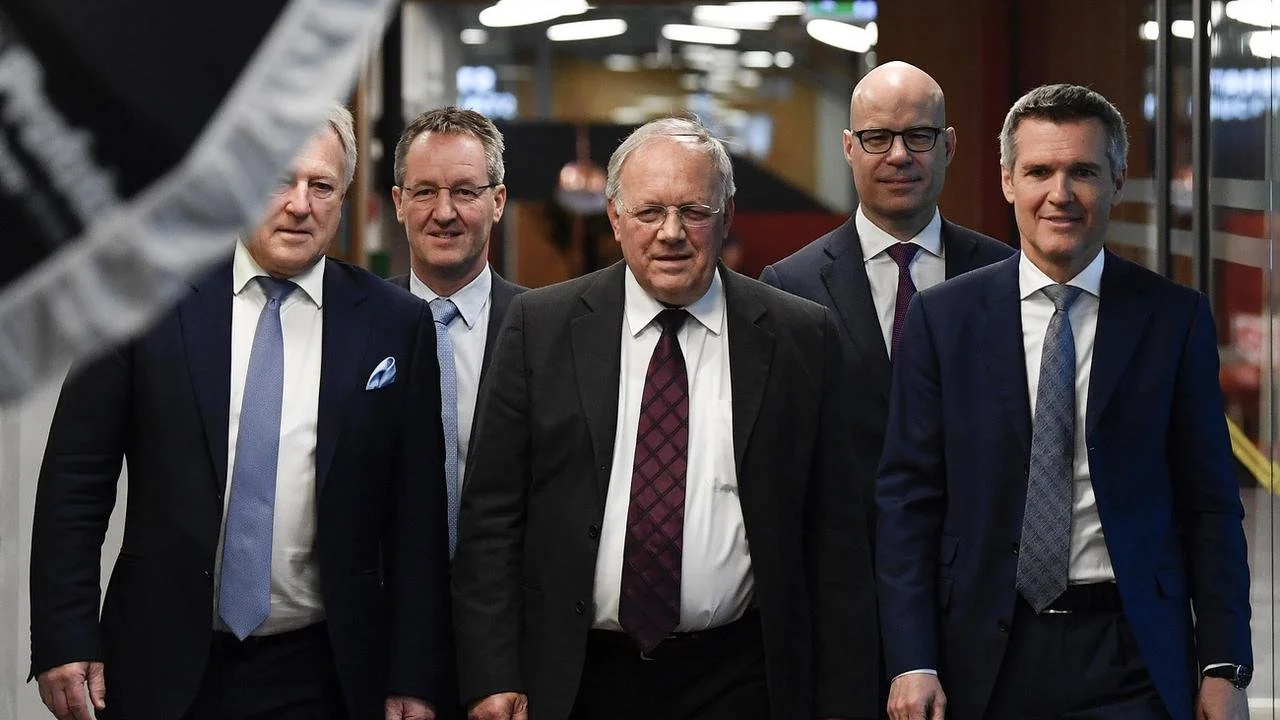9 Top Business Lobbying Groups in Switzerland
Business in Switzerland comes in many shapes and sizes - from global corporations to mom-and-pop shops to highly-specialised manufacturers.
But who shapes the industries that drive Switzerland’s economy? Who speaks for the men and women who keep the engine of Swiss business humming?
Besides the businesses themselves, other voices often speak up.
And some of them are very powerful.
Here are 9 Swiss business lobbying groups that work (sometimes silently, sometimes not) to promote their industry and its interests.
Economiesuisse boss Monika Rühl
Economiesuisse
Economiesuisse is the largest umbrella organization representing Swiss business interests, covering nearly all major industries and regions of the country.
The organization represents around 100,000 companies—ranging from small enterprises to multinational corporations—which collectively employ approximately two million people. Its main activities include:
Advocacy for free-market policies, competitiveness, and sustainable economic growth.
Influencing national debate and referenda in areas such as taxation, research, energy, environment, infrastructure, and public health.
Providing a platform for members to engage with policymakers and society, facilitating dialogue between business, politics, and the public.
Coordinating with international bodies to represent Swiss economic interests on a global stage.
Economiesuisse emerged in 2000 from the merger of the Swiss Union of Commerce and Industry (Vorort) and the Society for the Promotion of the Swiss Economy. The organization operates out of offices in Zürich, Bern, Geneva, Lugano, and Brussels.
Its governing bodies include:
An Executive Board of elected representatives from member federations and companies, which sets overall strategy and policy.
The current president as of 2025 is Christoph Mäder; the managing director is Monika Rühl, who has held the post since 2014.
Economiesuisse plays a central role in Swiss politics as a direct negotiator and lobbyist on all major economic topics.
Key functions are:
Formal consultation on legislative proposals and initiatives in Parliament, especially those impacting business.
Advocacy for liberalization, lower taxes, minimal government intervention, and protection of enterprise freedom, which often means opposing more expansionist social policies.
Launching and supporting political campaigns on referenda, including initiatives targeting labor market liberalization, innovation, and trade agreements.
Networking and alignment with other business associations, international organizations, and Swiss cantonal chambers of commerce.
Economiesuisse thus functions as the top-level representative of Swiss business in all domains involving economic policy, regularly shaping legislation and national political discourse in favor of business-friendly frameworks, both domestically and abroad.
Want to see Swiss business in action?
Get plugged-in with weekly insights on the inner workings of the Swiss economy - including the people doing big (and small) things…that no one is talking about.
Swiss Employers' Association (Schweizerischer Arbeitgeberverband)
The Schweizerischer Arbeitgeberverband (SAV), also known as the Swiss Employers’ Association, is the leading voice for Swiss employers in matters of economics, politics, and public affairs.
Founded in 1908 and headquartered in Zürich, the SAV is the umbrella organization for about 90 regional and sector-specific employer associations and select individual companies. Collectively, it represents over 100,000 small, medium, and large companies employing nearly 2 million people across all areas of the Swiss economy.
Its core activities include:
Advocacy on labor market, employment law, and employer/employee relations, including occupational safety and health protections.
Shaping policy and frameworks related to education, vocational training, and workforce development.
Influencing social policy and social insurance, including health policy matters.
Representing Swiss employer interests internationally and participating in global employer policy discussions.
The SAV’s highest authority is its general membership assembly, which sets strategic direction, approves annual reports, and elects the executive board. The board consists of representatives from associated sector and regional associations, plus independent individuals, and determines policy guidelines.
The board elects a steering committee of 10–14 members, responsible for budget and major policy decisions, as well as coordination among member associations and with government and other economic umbrella organizations. The current president is Severin Moser, while day-to-day operations are led by managing director Roland A. Müller.
The SAV is one of Switzerland’s three most influential economic umbrella associations, alongside Economiesuisse and the Swiss Trade Association (SGV), focusing on consultations around federal legislative proposals (including constitutional changes), advocacy for liberal and market-economy-focused policies and lobbying among policymakers and governmental bodies.
It organizes the annual Arbeitgebertag with “big-picture” topics - including recent debates related to Swiss-EU relations.
Swissmem
Swissmem is the leading association for Switzerland's mechanical, electrical, and metal engineering (MEM) industries and related technology sectors.
It serves as the primary representative body for around 1,250 member companies, ranging from SMEs to large corporations, centered in Zurich and active nationwide.
Its main activities include:
Representation & Advocacy: Swissmem lobbies for favorable policy, economic, and regulatory conditions impacting the MEM industries. It facilitates dialogue with government, administrative bodies, and media to promote the sector's interests.
Networking & Specialist Groups: The association manages 24–25 sector-specific groups, hosting knowledge-sharing and specialist discussions on topics like HR, communication, export financing, and energy. These groups provide input on educational curricula and enable joint marketing, trade fair appearances, and statistical data collection.
Training & Development: Swissmem delivers a wide portfolio of training programs, including basic and vocational education, advanced management seminars, and technical courses through the Swissmem Academy. Courses cover leadership, cooperation, and communication, especially tailored for technology and engineering professionals.
Innovation & Technology Transfer: The association acts as a bridge between industry and academia to encourage technological development and knowledge transfer, focusing especially on SMEs and fostering competitiveness.
Social Partnership & Compensation: Swissmem administers a compensation fund for members and plays a key role in negotiating sector-wide collective agreements, sustaining industrial peace and social dialogue.
Data & Market Research: Tracks important industry metrics such as export rates, employment, and new orders; supports companies with access to current statistics and market research.
Swissmem regularly organizes and participates in industry events. These include:
Swissmem Industry Day: The annual flagship event brings together over 1,000 decision-makers in industry, business, and politics for high-level panels, networking, and discussion of current sector issues.
Trade Fairs & Specialist Conferences: Swissmem organizes joint booths and appearances at national and international trade fairs, as well as specialist seminars in areas such as leadership and technology management.
Calendar of Events: Offers talks, educational events, committee meetings, and industry gatherings throughout the year, accessible via their public calendar.
The leadership of Swissmem is led by two main figures:
President (since 2021): Martin Hirzel, who leads the strategic direction and represents Swissmem at the highest sectoral and policy forums.
CEO (Director, since 2019): Stefan Brupbacher, who manages day-to-day operations and implementation of Swissmem's initiatives and services.
Swissmem is headquartered in Zurich.
Swiss Banking Association Chairman Marcel Rohner
Swiss Bankers Association (SBA)
With Switzerland’s reputation for financial sector leadership, Swiss Bankers Association (SBA) plays a key role in policy making and international financial standards.
The Swiss Bankers Association (SBA) is the central industry organization representing the interests of the Swiss banking sector, both domestically and internationally, and serves as the principal lobby and policy body for Swiss financial institutions.
Some of its activities include:
Advocacy & Representation: The SBA advocates for the stability and competitiveness of the Swiss financial centre, lobbying for effective regulation, fair taxation, and improved market access for Swiss banks both at home and abroad.
Regulatory Dialogue: The SBA coordinates with regulators (notably FINMA and the Swiss National Bank) and helps shape self-regulatory standards, codes of conduct, and compliance rules for the sector, with a focus on practical, competitiveness-driven policies.
Training & Careers: The association is involved in promoting banking apprenticeships, professional development, and recruitment, supporting the next generation of Swiss finance professionals and ensuring continued sectoral expertise.
Data, Research & Sustainability: SBA publishes analysis and figures on the banking sector, like the Banking Barometer, and actively supports sustainable finance and ESG standards, with Switzerland being a European leader in sustainable investment.
Public Information & Consumer Advocacy: It supports public understanding of banking issues, including data protection, ombudsman services for mediation in disputes, and responsible finance education.
The Swiss Bankers Association (SBA) is currently led by CEO Roman Studer, supported by Deputy CEO August Benz, and an executive board including Jan Weissbrodt (Head of Financial Market & Regulation) and Anita Diensthuber (Head of Operations & Services).
The SBA's board comprises leading Swiss banking figures and sets strategic priorities across regulation, sustainability, and digital transformation.
SBA’s 2025 priorities include leading Swiss banking’s adoption of next-generation digital channels and generative AI (GenAI) for customer experience improvement, compliance automation, and operational efficiency.
The association continues to set new sector-wide ESG investment guidelines and promote Switzerland as a hub for sustainable financial products, with binding standards for banks and active participation in the Building Bridges sustainable finance platform.
Following the Credit Suisse crisis, SBA supports tighter “too big to fail” rules, stricter capital adequacy requirements, and improved liquidity measures, while advocating for competitive and proportionate regulatory adjustments under Basel III Final, effective from January 2025.
Swiss Insurance Association (SIA)
The Swiss Insurance Association (SIA) is the primary industry body representing most private insurers in Switzerland, including major companies like Swiss Life, AXA, Zurich, and Helvetia. Founded in 1900 and celebrating 125 years in 2025, SIA advocates for a balanced regulatory framework and sustainable development of the insurance industry, emphasizing the importance of fair competition, appropriate regulation, vocational training, and insurability of emerging risks such as cyber and natural disasters.
The association serves about 70 member companies that collectively account for over 95% of the Swiss insurance market, playing a key role in shaping policies and ensuring the industry's competitiveness in the national and international arena.
The leadership of the SIA is headed by President Dr. Stefan Mäder, Chairman of Swiss Mobiliar Holding Ltd., who took office in 2023.
The association's operational management is led by Director Urs Arbter. The Board of Directors comprises 14 high-level insurance executives from key firms, including re-elected members Rolf Dörig (former Chairman of Swiss Life) and others holding pivotal roles in companies like AXA and Zurich.
Swiss-American Chamber of Commerce CEO Rahul Saghal (left) with Novartis President Giovanni Caforio and Claude Cariola
Swiss-American Chamber of Commerce
The Swiss-American Chamber of Commerce (Swiss AmCham) is a leading non-profit organization dedicated to strengthening business, trade, and economic ties between Switzerland and the United States.
As one of Switzerland's largest associations for multinational companies, the Chamber represents both Swiss and American firms, facilitating high-level networking opportunities, providing essential business intelligence, and advocating for favorable business frameworks in both countries.
Led by CEO Dr. Rahul Sahgal, Swiss AmCham is headquartered in Zürich and operates chapters in both Switzerland and the U.S. Membership spans large corporations to SMEs, with tailored benefits and opportunities to engage through events, leadership, and advocacy.
The Chamber is extremely active in organizing and co-organizing events with prominent members of the Swiss and American business community - including one-on-one dialogues with key figures and larger forums for exchange.
Former Swiss Federal Councillor Johann Schneider-Ammann (centre) with Swiss industry leaders at the launch of the Swiss Entrepreneurs Foundation in 2019.
Swiss Entrepreneurs Foundation (SwissEF)
SwissEF is a non-profit foundation founded in December 2017, with the mission of promoting start-ups, entrepreneurial culture and improving framework conditions for innovation in Switzerland.
It was created under the patronage of then Federal Councillor Johann N. Schneider-Ammann as a non-profit association with the purpose of investing in Swiss start-ups and SMEs in critical growth phases, helping them scale internationally, and advocating for policy improvements around innovation and commercialization.
SwissEF is led by Joanne Sieber, its CEO (and also CEO of Deep Tech Nation Switzerland). The foundation’s board of directors is chaired by Christoph-Philipp von Aeschlimann (President). Other key board members include Dr. Stefan Mäder and Sabine Keller-Busse of UBS.
The SwissEF is supported by major sponsors including major Swiss institutions: Mobiliar, UBS, Credit Suisse, Swisscom, Gebert Rüf Stiftung, the law firm Wenger + Vieli.
SwissEF runs the UpScaler / Upscaler Growth Program, which helps Swiss start-ups with high growth potential to overcome scaling barriers, especially for foreign expansion, through workshops, expert networks, tactical planning, etc.
Through its Swiss Entrepreneurs Fund, SwissEF provides growth-financing both via direct investment and “fund-of-funds” roles, focusing on start-ups or SMEs with financing needs roughly CHF 5-15 million.
In December 2024, SwissEF joined forces with the Deep Tech Nation Switzerland Foundation with the goal of mobilising about CHF 5 billion annually over the coming decade to support Swiss deep-tech start-ups / scale-ups.
International Chamber of Commerce Switzerland (ICC Switzerland)
ICC Switzerland (International Chamber of Commerce Switzerland) is the Swiss national committee of the global ICC (International Chamber of Commerce). It was founded in 1922 by economiesuisse (then “Vorort”), the Swiss Bankers Association, and the Swiss Chamber of Commerce in France. icc-switzerland.ch+1 Its mission is to represent Swiss companies in international business, coordinate their voice in ICC policy and regulation, and engage with Swiss federal authorities on matters of international trade, arbitration, and global economic norms. icc-switzerland.ch+1
Key people include Jan Atteslander, who is Secretary General and Deputy Secretary General Emmanuelle Benitez de Roux.
The ICC Swiss Arbitration Commission is an important body of ICC Switzerland: it appoints Swiss arbitrators in ICC arbitration proceedings, produces guidelines, and helps coordinate Switzerland’s participation in ICC dispute resolution.
The ICC Switzerland’s main activities include:
Serving as the bridge between Swiss companies and global ICC bodies — selecting Swiss delegates for ICC commissions, policy work, events, publications.
Representing Swiss business interests to both Swiss federal administration and international trade & arbitration forums.
Hosting events on arbitration, trade, regulatory developments, global business norms.
Distributing ICC standards and tools such as the Incoterms, trade & arbitration rules, publications.
Ringier CEO and digitalswitzerland mastermind Marc Walder
digitalswitzerland
digitalswitzerland is Switzerland’s most influential lobbying and platform organisation for digital transformation. Born out of the “Digital Zurich 2025” initiative launched by Ringier CEO Marc Walder, it has grown into a nationwide alliance of more than 170 members from business, academia, the public sector, and civil society.
Its core mission is to make Switzerland a leading global hub for digital innovation by pushing policy frameworks, fostering talent, and promoting trust in new technologies.
The organisation is led today by Franziska Barmettler, who became CEO in November 2024 after a career at Swiss International Air Lines and Ikea, and Andreas Meyer, former SBB chief, who took over as President in June 2024. Walder remains influential as founder and chair of the steering committee.
The board and steering group bring together senior Swiss and international business leaders such as Christine Antlanger-Winter (Google Switzerland), Catrin Hinkel (Microsoft Switzerland), and Christian Keller (IBM Switzerland), underscoring its weight as a cross-sector coalition.
digitalswitzerland’s activities are wide-ranging:
It lobbies on digital policy and regulation, from AI frameworks to data privacy and cybersecurity; it runs skills and education initiatives to address talent shortages
It helps create innovation networks linking start-ups, corporates, universities, and cantons.
It also stages large public events such as the annual Digital Day to foster dialogue and trust in digital transformation, and drives sector-specific programmes in digital health, sustainability, and infrastructure.
The organization’s “Strategy 2025” outlines measurable goals to keep Switzerland competitive in the global digital economy.




